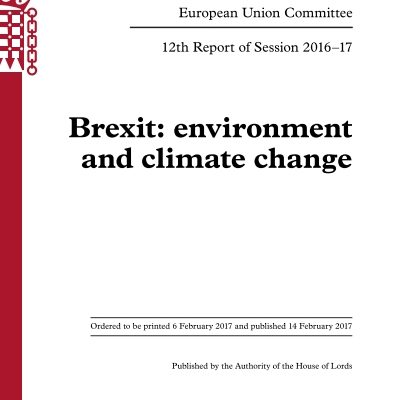Government’s response to Lords Brexit and Environment report: Still a governance gap?

The government has responded to the House of Lords EU Committee report on Brexit & the Environment. The HoL report, published in February was particularly critical of the government’s handling of governance questions (read our summary of the report) stressing that “the Government’s confidence in its ability to ‘hold itself to account’ contrasts with the concern expressed by the vast majority of our witnesses”.
The government’s response raises a number of key points on governance, devolution, and agriculture.
On governance, the Government rejects the Committee’s call for additional enforcement mechanisms, to address the gap left by the EU. Instead, the Government argues it can rely on existing Judicial Review & Parliamentary oversight.
On devolution, the government rejects the idea that powers would go straight from Brussels to the devolved administration. Instead, some powers would be “passed” by Westminster to the devolveds. The government will decide which are the “right” powers to be exercised at which level of governance.
Finally on agriculture the government explains replacing the CAP will take time and future policy should not felt bound by the current arrangements. Policy will be driven by a twin ambition for competitiveness and environmental protection.
Throughout the document, the government reiterates call for a ‘smooth and orderly’ transition mentions repeatedly its manifesto commitment to be the first generation to leave the environment (in England) in a better state and its pledge to publish a 25 year plan for the environment in the course of this Parliament (but this has been changed, of course, by the snap election). It further calls for “a partnership of friends and allies, of interests and values” with the EU.
But beyond these commendable objectives the government does not budge on governance at all, both with regards to enforcement (existing UK arrangements will have to suffice) and with regards to devolution (Westminster will choose what remains centralised). Reading the government’s response, the governance gap appears to be here to stay — this contrasts with Labour’s new Brexit policy pledging to address post-Brexit enforcement challenges.








